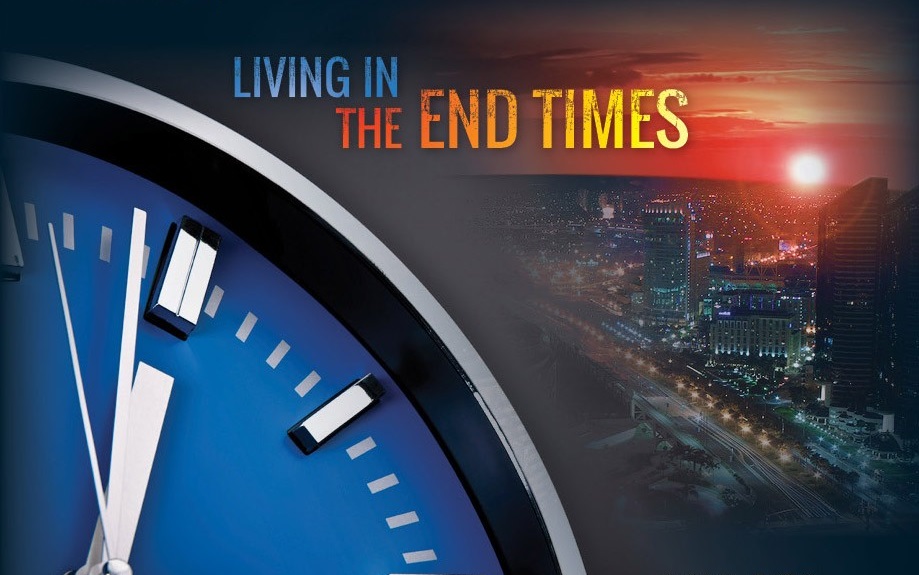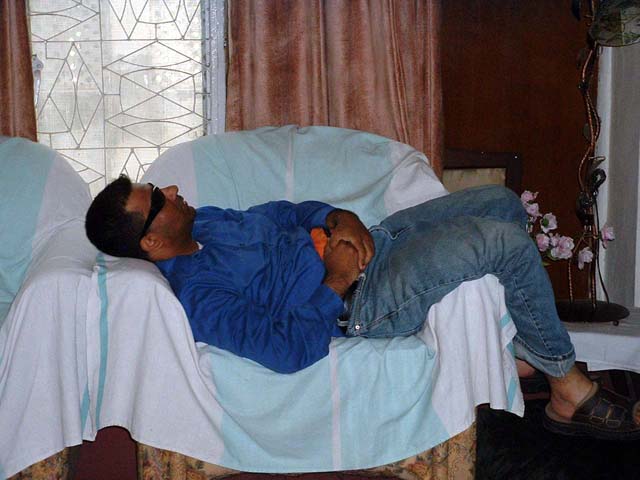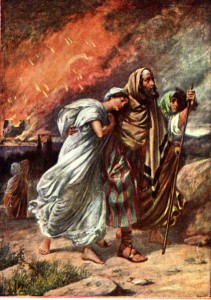
Revelation 1
Revelation 1:1, Must shortly take place/come to pass. John expected that the prophecies that followed were about to occur. This seems to be proof that the Book of Revelation (at least up to Rev 10:11) was written before A.D. 70. The second half of this book was John prophesying again (see Rev 10:11) and must have been written after the fall of Jerusalem at the hand of the Romans.
Revelation 1:2, Testimony. In the New Testament or Testimony (marturia) of Yeshua (as compared to the Old Testament, also known in the book of Revelation as the Word of Elohim), the word testimony (as found in many places) is either the Greek word marturia or marturion meaning “testimony, witness, or one who testifies.” Interestingly, our English word martyr comes from these Greek words. A martyr is one who testifies to their faith and is killed for it. These Greek words refer to both one who shares their testimony of the good news of Yeshua or the gospel message including their personal testimony. It can also refer to one who as a prophet testifies of future events, but the word is not confined to that meaning only. Consider this. One doesn’t have to be a prophet to testify to the future events that the Bible already tells us are coming such as the second coming, the establishment of Elohim’s kingdom on earth, punishment for the wicked and rewards for the righteous, the glorification of the saints as well as inclusion in the family of Elohim as his glorified and spiritual children. These are all future events and are part of the gospel message.
Marturia and marturian come from the root word martus which is “a witness in a legal or historical sense, a spectator to anything.” As born again believers in Yeshua, we are witnesses to the power of Yeshua in our lives and the validity of the gospel message. For example, Stephen was a martus or martyr (Acts 22:20) as he was preaching the gospel to those who stoned him (see also Rev 2:13 where Antipas was slain for his faith as well). In the Gospel of John, John the apostle writes (marturia) the record John the Baptist in John 1:19. In John 1:32, John the Baptist records or bears witness (martureo) of what he saw pertaining to Set-Apart Spirit coming down upon Yeshua. A little later, John the Gospel writer testifies (martureo) that Yeshua is the Son of Elohim (John 1:34). The word martureo is also used of those who viewed the miraculous resurrection of Lazaurs (John 12:17), and of John who was witness to or who bore record of (martureo) the death of Yeshua (John 19:35). Many more examples could be given, but you get the idea. Marturia and its cognates can have several meanings that include the gift of prophecy, but is not limited to that.
Revelation 1:7, Even they who pierced him. How will those who killed Yeshua see him at his second coming if they are dead? Only those alive on earth and the righteous dead will be resurrected at his second coming will see him. Perhaps, they will see him descending from the New Jerusalem in his power and glory at the end of the Millennium when he will resurrect all the unrighteous dead who then must appear before him on bent knew at the white throne judgment before being cast into the lake of fire. Or perhaps Yeshua is referring to the children of those who were responsible for his crucifixion, since their parents made the responsible for his death as well when they declared, “His blood be on us and on our children” (Matt 27:25).
Revelation 1:10, The Lord’s Day. This verse is one of the cliche biblical passages that mainstream church scholars use to “prove” Sunday’s replacement of the Sabbath. The problem with this position is that there’s no clear scriptural proof that the apostles ever changed the Sabbath to Sunday. What’s more, to view this passage as referring to Sunday is to take a phrase the early church fathers used as a euphemism for Sunday when pushing for Sunday in place of Sabbath observance and to retroactively apply this meaning to John’s use of the phrase. Frankly, it is biased and dishonest scholarship to take the phrase “the Lord’s day” with its second century colloquial meaning and then to back-apply this meaning to John’s use of the phrase when there’s no reason to believe this was John’s intended meaning.
Alternatively, the phrase, “the Lord’s day, can be a reference to the biblical term “the day of the Lord’s wrath” when YHVH, in the end times, will judge the nations for their wickedness. This is a point that several biblical scholars have made (see From Sabbath to Sunday, by Samuele Bacchiochi, p. 111; E. W. Bullinger’s Companion Bible footnote on Rev 1:10; The Jewish New Testament Commentary on this verse, p. 791, by David Sterns).
There is actually more scriptural proof that the phrase “the day of the Lord” is a reference to the seventh day Sabbath than to the first the week. In Isaiah 58:13, the prophet YHVH refers to the Sabbath as “my holy day…the holy day of the Lord.” So conceivably, it could have been on the Sabbath day itself that John received his vision on the island of Patmos about that great and terrible day of YHVH’s wrath that is to come on the earth just prior to the Messiah’s second coming.
Revelation 2
Revelation 2:17, A white stone. The Romans of biblical times exchanged a token of friendship between friends that could be passed on down from one generation to another. The ritual consisted of two friends writing their names on a tile of wood or stone, which was then divided in half and each took the piece containing name of their friend. To produce the counterpart of the one of the pieces to the other friend (or his heirs) guaranteed friendship and hospitality. The white stone with a new name on it is likely a reference to this first century practice (Manners and Customs, p. 70).
Revelation 2:27, A rod of iron. Yeshua’s rod of iron is similar to the scepter of a king, which was taken from the shepherds rod, since a king was viewed as the shepherd of his people. The scepter was not only a symbol of protection, but of power and authority.
Revelation 2:28, The morning star. In the Latin Vulgate Bible (translated by Jerome in about A.D. 400 for the Roman Catholic Church) is the official Latin Bible of the Catholic Church the biblical term morning start is translated into Latin as lucifer. According to the Catholic Encyclopedia, when morning star is translated as lucifer, it is not referring to the devil, but rather denotes the exalted state from which he fell. That exalted state refers to the glory of heaven or the morning star (Rev 2:28), and to Yeshua himself who Peter and John refer to as the Morning Star (2 Pet 1:19; Rev 22:16) (http://www.newadvent.org/cathen/09410a.htm). The name Lucifer appears in some Catholic liturgy. It would seem that this is not a reference to the devil, but to Elohim or to Yeshua.
Revelation 3
Revelation 3:9, Worship/bow down before your feet. This scripture has puzzled many. Who are these saints before which those who are of the synagogue of Satan will at some time in the future bow down in worship? Who are those who are of the synagogue of Satan? First, the saints are wearing crowns (verse 11) and they have the name of Elohim written upon them (verse 12). We know that a group of saints will be ruling with Yeshua in his millennial kingdom (Rev 1:6; 5:10). These same saints will be part of the first resurrection (Rev 20:6), which occurs at Yeshua’s second coming. Not all saints will be kings and priests. There are levels of rewards (and responsibilities) in YHVH’s kingdom depending on how obedient one has been to his Torah-commandments. This Yeshua teaches in Matthew 5:19. Some saints will be the least in his eternal kingdom, while some will be the greatest depending on their level of Torah-obedience. Similarly, Yeshua identifies two groups of saints in his Parable of the Ten Virgins (Matt 25:1–13)—the wise saints and the foolish saints. The wise virgins will go into the wedding supper of Yeshua, and presumably will become his bride, while the foolish ones will be left outside. In Revelation chapter three, Yeshua further identifies two groups of believers: those who are spiritually lukewarm and those who are spiritually hot (Rev 3:14–22). It is not a stretch to connect those who are spiritually on fire in Laodicea with those in Philadelphia who have been faithful to his commands, who will be given a crown and who will be worshipped.
Can we further identify these faithful saints who will be worshipped (or before whom the knees of lower order saints will bend, which is the actual meaning in the Greek of the word worship) in Yeshua’s kingdom? They have crowns and are thus ruling as kings and have the name of Elohim written on them. Similarly, the 144 thousand have the seal of YHVH’s name on them (Rev 7:3–4 and 14:1), and they keep his Torah commandments and have the testimony or faith of Yeshua (Rev 14:12). These are the likely candidates for being those Yeshua describes in Matthew 5:19 who will be the greatest in the kingdom of Elohim, and who others will worship (Rev 3:9).
Why would people be worshipping (or bending the knee before) these glorified, resurrected and kingly saints? There are several possible explanations here for this. First, the bride of Yeshua will be ruling and reigning with Yeshua as a queen (in ancient Jewish thought) or like a king (under Yeshua, who is the King of kings, as presented in the book of Revelation). Second, Paul teaches us that those saints who will be resurrected will be literally adopted (Rom 8:15, 23; 9:4; Gal 4:5; Eph 1:5) into the family of Elohim as sons or children of YHVH Elohim.
In Galatians, Paul speaks of redeemed believers being both Abraham’s seed and being adopted as sons of Elohim (Gal 3:29; 4:5). Elsewhere where the term adoption is used in the Testimony of Yeshua, it is in reference to our relationship with our Heavenly Father, not with our earthly father, Abraham. The redeemed are therefore, sons or the seed of Abraham, yet adopted into the family of Elohim as spiritual sons (Rom 8:15, 23; Eph 1:5). In other words, the saints are literal sons or seed (physically) of Abraham, yet adopted sons (spiritually) of YHVH. This adoption will be finalized or completed at the resurrection when the saints receive their spiritual bodies (Rom 8:23), for then they will be like him for they shall see him as he is (1 John 3:2).
Elohim is a plural word in Hebrew and can mean many things, and has many usages in the Scriptures. It is used to refer to the Creator, YHVH Elohim, as well as to angels, kings, judges and humans in authoritative capacities. When the saints are resurrected, they will be as Elohim and will be part of the family of Elohim, though they will not be Elohim, who has existed forever and is the Creator of all things. It appears that these saints will be worshipped, not as YHVH Elohim, but as his created sons who have been elevated through the process of redemption, sanctification, glorification and adoption into members of the family of Elohim.
Revelation 3:14, The church at Laodicea.
Laodicean Church: Awaken!
Will you pass the test and make the grade?

Life is a series of tests. We either pass or fail them. YHVH is the school teacher who determines whether we will pass or fail, not us. His Word is our text book that tells us how to pass. If we learn the lessons and put to practice the things we have learned, we will pass. If not, we will fail.
The problem is that we’re not just in a regular school classroom where if we fail, it’s really not a big deal in the bigger scope of life. No. Our “classroom” is this life. Whether we pass or fail will determine not only whether we will obtain eternal life or eternal damnation, but if we pass, the grade we get will determine our level of rewards in YHVH’s eternal kingdom. As should be obvious, there are a couple of important things going on here: there is not only the issue of life after death, but if we pass the test of life and are granted eternal life, where will we be, what will we be doing and, most importantly, how close will we be to the Creator. Some people will be existing in close proximity to YHVH Elohim, while others will be living further away.
Continue reading






